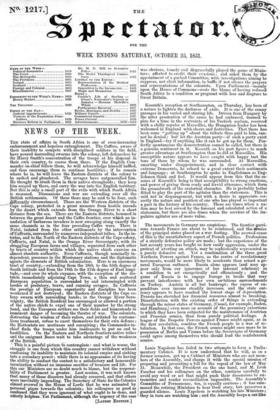The movements in Germany are suspicious. The frontier sons towards
France are about to be reinforced, and the of the principal states placed on a war footing. The avowed cause of this is the unsatisfactory aspect of French politics. Professions of a strictly defensive policy are made ; but the experience of the last seventy years has taught us how easily aggression, under the I pretext of averting an attack, may be sophistically represented as , a purely defensive act. Yet a combination_ of the three great Northern Powers against France, as the centre of revolutionary movements, would be more likely to accelerate than retard a ge- neral European outburst. Russia alone appears (and may ap- pear only from our ignorance of her internal relations) in a condition to act energetically and efficaciously ; and the game of Russia is to engage Europe in broils that may prevent interference with her own anbitious .encroachments on Turkey. Austria is all but bankrupt; the excess of ex- penditure over income steadily increases, and .the state cur- rency appears to have reached the lowest stage of depreciation. Prussia has stretched her financial resources almost to breaking. Dissatisfaction with the existing order of things is extending through the minor states of Germany, (Cassel, for example, Baden, and Hamburg,) even more on account of the pecuniary extortions to which they have been subjected for the maintenance of Austrian and Prussian armies, than from purely political feelings. A league of the Despotic Powers against France might again, as in the first revolution, combine the French people in a war of re- taliation. In that case, the French armies might once more be in possession of,Berlin and Vienna before the Sovereigns of Germany could agree among themselves who should lead the confederated, armies.


























